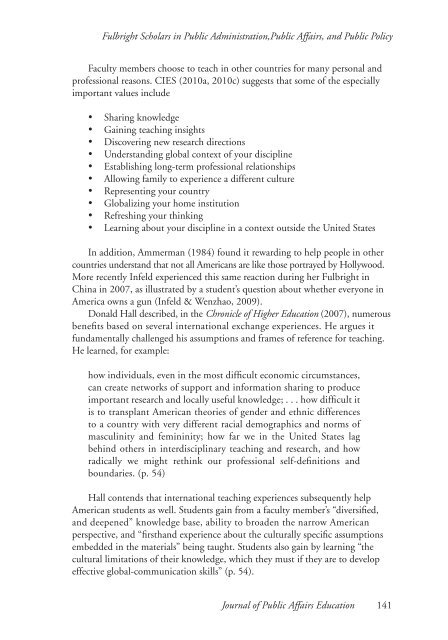Journal of Public Affairs Education
Create successful ePaper yourself
Turn your PDF publications into a flip-book with our unique Google optimized e-Paper software.
Fulbright Scholars in <strong>Public</strong> Administration,<strong>Public</strong> <strong>Affairs</strong>, and <strong>Public</strong> Policy<br />
Faculty members choose to teach in other countries for many personal and<br />
pr<strong>of</strong>essional reasons. CIES (2010a, 2010c) suggests that some <strong>of</strong> the especially<br />
important values include<br />
• Sharing knowledge<br />
• Gaining teaching insights<br />
• Discovering new research directions<br />
• Understanding global context <strong>of</strong> your discipline<br />
• Establishing long-term pr<strong>of</strong>essional relationships<br />
• Allowing family to experience a different culture<br />
• Representing your country<br />
• Globalizing your home institution<br />
• Refreshing your thinking<br />
• Learning about your discipline in a context outside the United States<br />
In addition, Ammerman (1984) found it rewarding to help people in other<br />
countries understand that not all Americans are like those portrayed by Hollywood.<br />
More recently Infeld experienced this same reaction during her Fulbright in<br />
China in 2007, as illustrated by a student’s question about whether everyone in<br />
America owns a gun (Infeld & Wenzhao, 2009).<br />
Donald Hall described, in the Chronicle <strong>of</strong> Higher <strong>Education</strong> (2007), numerous<br />
benefits based on several international exchange experiences. He argues it<br />
fundamentally challenged his assumptions and frames <strong>of</strong> reference for teaching.<br />
He learned, for example:<br />
how individuals, even in the most difficult economic circumstances,<br />
can create networks <strong>of</strong> support and information sharing to produce<br />
important research and locally useful knowledge; . . . how difficult it<br />
is to transplant American theories <strong>of</strong> gender and ethnic differences<br />
to a country with very different racial demographics and norms <strong>of</strong><br />
masculinity and femininity; how far we in the United States lag<br />
behind others in interdisciplinary teaching and research, and how<br />
radically we might rethink our pr<strong>of</strong>essional self-definitions and<br />
boundaries. (p. 54)<br />
Hall contends that international teaching experiences subsequently help<br />
American students as well. Students gain from a faculty member’s “diversified,<br />
and deepened” knowledge base, ability to broaden the narrow American<br />
perspective, and “firsthand experience about the culturally specific assumptions<br />
embedded in the materials” being taught. Students also gain by learning “the<br />
cultural limitations <strong>of</strong> their knowledge, which they must if they are to develop<br />
effective global-communication skills” (p. 54).<br />
<strong>Journal</strong> <strong>of</strong> <strong>Public</strong> <strong>Affairs</strong> <strong>Education</strong> 141



